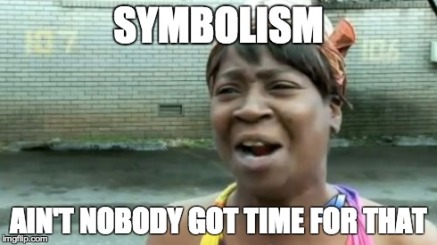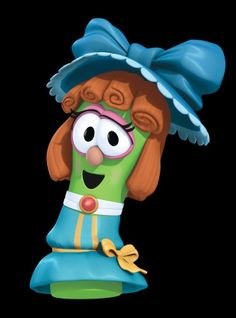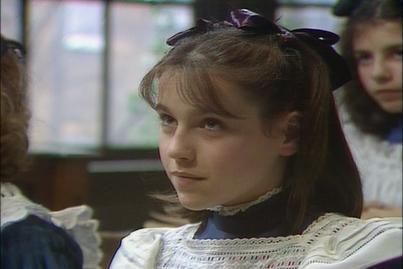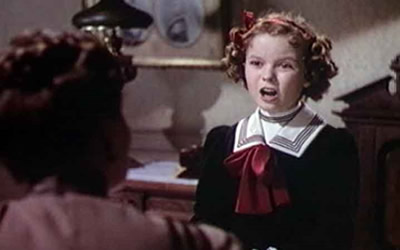The Penniless Princess, Part 2
Having arrived at school, we meet the villain of the piece, Miss Minchin. And honestly, not bad. I can dig it. Apparently, she is a green onion. I have no idea if different vegetables are supposed to mean different things, btw, or if they just pick different veggies and try to include everything.

In another bit of adult humor, there is an ominous thunder-and-lightning when Miss Minchin is introduced, despite the sunny day outside. I admit, I chuckled.
But I need help with something. The introduction of Miss Minchin is also the introduction of a running gag: any time anyone says the words “Miss Minchin,” a horse whinnies. This is played for laughs, but I don’t get the joke. Honestly, I have absolutely no idea. Help!
We also meet Miss Amelia. In the book, Miss Amelia is Miss Minchin’s browbeaten younger sister. Here, they have combined the character with the French master from the book, Msr. Dufarge. So the character is still Amelia, but not Miss Minchin’s sister and she teaches French.
Eh, I can dig that, too. They have to shorten this story somehow.
What I can’t dig, however, is that Amelia is a blueberry. Last I checked, blueberries are not vegetables.
Oh, and while I’m at it, check this out:

Here is Sara in The Penniless Princess.

Here is Sara from the miniseries, looking very much as Sara is described in the book.

And here is Shirley Temple as Sara.
So, suspicion confirmed: they were clearly basing this more on the Temple version than the actual book. Sara Crewe, the real one, has short, straight dark hair, not red ringlets.
Not to mention that immediately, Sara acts all cutesy-child, in a decidedly un-Sara Crewe-like way:
“We rode a boat all the way from Africa! There was a storm one night at dinner, and the waiters kept dropping the dishes!” *giggles*
And the hits just keep on coming. Much as in the book, Sara requests a single doll, to have someone to talk to while her father is gone.
“You mean like…THIS ONE???” *Captain Crewe levitates a teddy bear out of thin air*
Um, no, Dad. That is a teddy bear. I asked for a doll. Idiot.
But Sara is delighted, even though every single other version has gotten this right: Sara has a doll, named Emily.
Now she has a bear, whom she inexplicably names Mortimer. Again, I am at a loss as to why they made this change. The only possibility that occurs to me is they felt there was a lack of male characters in this show, so they changed Sara’s toy from a girl doll to a boy bear.
(This is not the last gender-switch they will pull, either. Grrr…)
Miss Minchin, btw, is allergic to Mortimer. Or his stuffing, or something. This is also played for laughs. Allergies, HA!
All that done, Sara and Captain Crewe hug (or rather, they lean against each other, because no arms), and off he goes, back to India Africa.
Sara immediately (and I do mean right that very second) goes to French class. In another cute moment of adult humor, the lesson is completely on French phrases that many American adults would know, such as “a la mode” and “cul-de-sac.”
This French class scene stays mostly true to the book: it’s a pivotal scene, where Miss Minchin first begins to truly resent Sara, already bilingual at age seven. In fact, it’s one of several instances where dialogue is lifted directly from the book, so..kudos!
Here, we also meet Sara’s future best friend, Ermengarde. And here we have a change: Ermengarde in the book is a not-very-bright girl, due to a combination of being…well, not very bright, and having a very overbearing father. But she and Sara are BFFs anyway, because Ermengarde also happens to be sweet and loyal and generous and loving.
And here, “Ermie” (a piece of asparagus) is just a goofball. The kind of cutesy little sidekick who shrieks every line. Great.
And it’s time for another song! Great. Again. This one is about imagining things. Now, this is a very important theme of A Little Princess—that imagining things can help us get through tough times…but this song, again, just doesn’t seem very catchy to me.
So, after their one five-minute class of the day, and their one five-minute playtime of the day, Sara and Ermie part ways and Sara heads back to her room…where she finds the little servant girl, Becky, asleep. This is, again, a very true-to-the-book scene, right up until the show starts playing it for laughs, having Becky (a blonde-haired carrot, if you care) fall asleep every few seconds, then wake up and not remember a thing, all Memento-style.
Sara proves her niceness by levitating a piece of cake at Becky.
And so, we now know all the characters we need to know…for now. The Penniless Princess has completely dispensed with Lottie, another of Sara’s friends from the book. And again, I don’t blame them for that a bit—Lottie is a very young, motherless girl whom Sara takes under her wing, even going so far as to let Lottie pretend that she, Sara, is her mama. And I can see how that might be confusing for the little kids this is aimed at.
Next time…Sara’s birthday party!
Posted on January 6, 2017, in The Penniless Princess. Bookmark the permalink. 6 Comments.
The whinnying horses is almost certainly a reference to the Mel Brooks movie Young Frankenstein, in which whenever anyone says the name “Frau Blücher,” horses whinny. In YF the joke is built up over the course of the movie by the whinnying being increasingly out of place – we’re first introduced to Frau Blücher when she meets the eponymous Frankenstein’s carriage, and her name is accompanied by an ominous crack of lightning, so the whinnying makes sense. The absurdity of the gag ramps up until her name is followed by distant whinnying even when spoken indoors, where the horses couldn’t possibly have heard it.
(The last occurrence in this video was edited in, obviously).
I can’t recommend Young Frankenstein enough – in my opinion it’s Mel Brooks’ best film.
Oh snap! It has been WAY too many years since I’ve watched Young Frankenstein! Thanks you—that must be it!
In the book, I kind of got the impression that Miss Minchin was resentful of Sara because she handled the situation badly. Which even the book admits –Sara was only 7, after all. Miss Minchin didn’t know Sara could already speak French and 7 year old Sara didn’t know how to explain the mistake.
So the French tutor shows up, and Sara starts speaking fluent French…
And Miss Minchin feels insulted, because it feels to her like Sara held back so she could show off for the tutor.
The book even tells us that if Sara had been older she would have been able to explain to Miss Minchin that she could already speak French, but at age 7 I certainly didn’t always have the words I needed to explain things.
I’d have to go re read the book as an adult, but that was what I remembered from having read it over and over again as a child.
I also remembered that some of the things Sara said came across as a little bit braggy, but even then I could excuse it because this didn’t seem intentional.
Yeah, VeggieTales has gone from looking completely like vegetables to trying to humanize the characters a bit. I think that is what is with the weird hair.
What is inexcusable to me is that I just watched a VeggieTales episode wherein the Veggies had hands –BUT NO ARMS.
So instead of things just levitating in front of them, they had these disembodied hands that were just….
Honestly, either give them arms or leave off the hands. Please. It’s way less creepy.
Yeah, it’s a pretty deep scene for a kid’s book. Miss Minchin also feels some extra feels because she’s self-conscious about not being able to speak French herself. So here’s this very little child, whom she perceives (fairly or not) as showing her up. Meanwhile Sara is trying to do the best she can, and she doesn’t quite know how to explain herself, yet she’s also fairly conscious that she is usually the smartest person in the room.
More on this anon. 😉
I did not expect a Young Frankenstein reference in a VeggieTales movie. That’s kind of awesome. I have mixed feelings about the VeggieTales movies. I like some of the songs and jokes and pop culture references they have in them, but I don’t care for religious message. And some of the changes they make to the source material seem unnecessary and make their movies a lot weirder than the original stories they’re based on.
Pingback: Deconstruction Roundup for January 13th, 2017 | The Slacktiverse